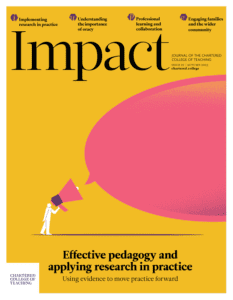Applying the science of learning in secondary school classrooms: A case study of a ‘psychology for learning’ course for Year 9 students
Written by: Purvi Gandhi and Deborah Outhwaite

6 min read
Purvi Gandhi, Head of Psychology, Trent College, UK
Deb Outhwaite, Director, Derbyshire Teaching Schools Alliance (DTSA), UK
Introduction
The science of learning provides valuable insights into information processing and retention, yet applying this knowledge to classroom practice remains a challenge. Understanding how students learn can help teachers to improve practice and empower students to enhance their learning. Thornton (2022) advocates that students, as key stakeholders in the learning process, be brought into the conversation about the application of cognitive science in the classroom. This view is supported by Clear (2018), who suggests that teachers need to make the cognitive science of learning more explicit to students. Doing so should not only improve attainment but also enhance motivation for students to take ownership of their own learning.
This article presents findings from a pilot practitioner research study that explored the impact of teaching the cognitive sc
Join us or sign in now to view the rest of this page
You're viewing this site as a guest, which only allows you to view a limited amount of content.
To view this page and get access to all our resources, join the Chartered College of Teaching (it's free for trainee teachers and half price for ECTs) or log in if you're already a member.
- Atkinson R and Shiffrin R (1968) Human memory: A proposed system and its control processes. In: Spence K and Spence J (eds) The Psychology of Learning and Motivation: Advances in Research and Theory. New York: Academic Press, pp. 89–195.
- Baddeley AD and Hitch G (1974) Working memory. In: Bower GH (ed) Psychology of Learning and Motivation, volume 8. New York: Academic Press, pp. 47–89.
- Clear J (2018) Atomic Habits: An Easy & Proven Way to Build Good Habits & Break Bad Ones. New York: New York: Penguin.
- Hmelo‐Silver CE and Pfeffer MG (2004) Comparing expert and novice understanding of a complex system from the perspective of structures, behaviours, and functions. Cognitive Science 28(1): 127–138.
- Kahneman D (2000) Thinking, Fast and Slow. New York: Farrar, Straus and Giroux.
- Roediger III HL and Karpicke JD (2006) Test-enhanced learning: Taking memory tests improves long-term retention. Psychological Science 17(3): 249–255.
- Shimamura A (2018) MARGE: A whole-brain learning approach for students and teachers. Available at: https://shimamurapubs.files.wordpress.com/2018/09/marge_shimamura.pdf (accessed 20 April 2023).
- Thornton R (2022) The science of learning: Is it time to bring students into the conversation? Impact 16: 29–31.
- Yeager D and Dweck C (2012) Mindsets that promote resilience: When students believe that personal characteristics can be developed. Educational Psychologist 47(4): 302–314.
0
0
votes
Please Rate this content
Subscribe
Please login to comment
0 Comments
Oldest
Newest
Most Voted
Inline Feedbacks
View all comments










